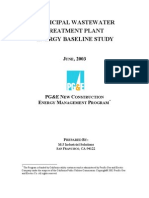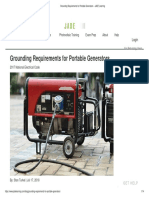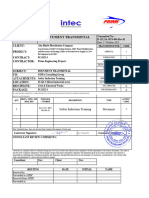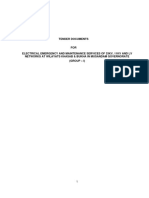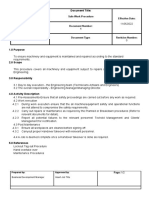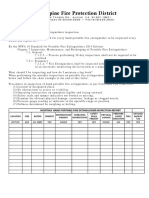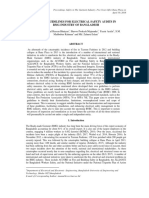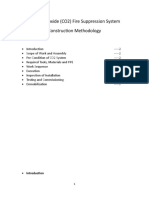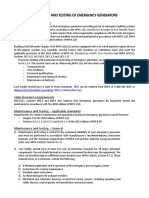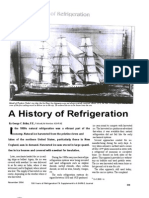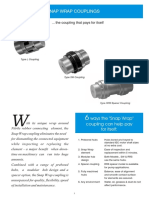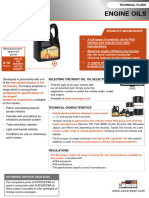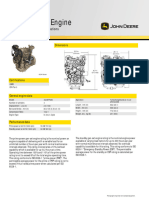Sec. 16230 Diesel Generator
Uploaded by
Yasir TPSec. 16230 Diesel Generator
Uploaded by
Yasir TP16230
DIESEL GENERATOR SETS
FEDERAL ENGINEERING CONSULTANTS DIVISION 16: ELECTRICAL WORK
Section 16230 – DIESEL GENERATOR SETS
Contents
1 GENERAL
1.1 REFERENCE
1.2 DESCRIPTION OF WORK
1.3 QUALITY ASSURANCE
1.4 SUBMITTALS
2 PRODUCTS
2.1 TYPE OF DIESEL ENGINE AND OPERATING CONDITIONS
2.2 FUEL
2.3 ENGINE LUBRICATION
2.4 GOVERNOR
2.5 STARTING SYSTEM
2.6 COOLING SYSTEM
2.7 SAFETY GUARDS
2.8 SILENCERS
2.9 AIR FILTERS
2.10 GENERATOR
2.11 VENTILATION
2.12 VOLTAGE REGULATION
2.13 ENGINE/GENERATOR CONTROL PANEL & AUTOMATIC TRANSFER SWITCH
2.14 SET MOUNTINGS
2.15 MODE OF OPERATION
3 EXECUTION
3.1 INSTALLATION
3.2 TESTING AND COMMISSIONING
Residential Building Page 2 of 18
FEDERAL ENGINEERING CONSULTANTS DIVISION 16: ELECTRICAL WORK
Section 16230 – DIESEL GENERATOR SETS
SECTION 16230
DIESEL GENERATOR SETS
1.0 GENERAL
1.1 REFERENCE
Conform to General Requirements for Electrical Services of Division 16.
1.2 DESCRIPTION OF WORK
1.2.1 This Specification covers the supply, installation and commissioning of diesel generating plant
consisting of diesel generator set and related control panel supplied in accordance with the
specification as follows:
A. The generating set shall be provided complete with all ancillary plant and apparatus, associated
control and alarm panels, switchgear, interconnecting wiring, cabling, and all other equipment
required for the operation of the set.
B. The rating of the sets shall be adequate to meet the estimated load as shown on the drawing while
taking into consideration the ambient temperature conditions of 50 deg.C and 100% humidity.
C. The generators shall also be capable of handling the starting current of the connected equipment
with the voltage dip within limits acceptable to the equipment manufacturers.
D. While taking into consideration the ambient temperature conditions referred to in this
specification:
The generator rating indicated on the drawings is the standby power rating of the diesel
generator set after applying the derating factors to compensate for the ambient temperature and
humidity indicated in the specification.
E. The Schematic Single Line Diagram shows the equipment required to be supported by the
generator.
F. The Contractor shall provide all details of these equipment to the Generator Manufacturers to
ensure that they consider the characteristics of these loads (such as power factor, harmonic
content, etc.) when selecting generator components. The Contractor shall verify the manufacturer
selection and offer to the Engineer for approval. A complete selection strategy shall be prepared
detailing step loads and timed delays to ensure minimal droop etc.
1.3 QUALITY ASSURANCE
Design, manufacture, testing and method of installation of all apparatus and materials furnished
under
requirement of these specifications shall conform to latest publications or standard rules of the
following:
Residential Building Page 3 of 18
FEDERAL ENGINEERING CONSULTANTS DIVISION 16: ELECTRICAL WORK
Section 16230 – DIESEL GENERATOR SETS
A. Dubai Water and Electricity Authority (DEWA) regulations for electrical installation works
B. Department of Civil Defence requirements
The following are relevant IEEE, ANSI, NEMA, BS Specification recommendations except
where modified by this specification: -
NEMA-ICS Industrial Controls and Systems
NEMA-MG1 Motors and Generators
NEMA-PB2 Dead Front Distribution
NEMA-RI2 General Purpose and Communication
NFPA-30 Flammable and Combustible Liquid Code
NFPA-37 Stationary Combustion Engine and Gas Turbine
NFPA-70 National Electrical Code
ANSI-C39.1 Electrical Analog Indicating Instrument
DEMA Standard Practice for Stationery Diesel and Gas
Engines
IEEE-20 Low Voltage AC Power Circuit used in enclosures
IEEE-5G Semi Conductor Rectifier Components
IEEE 472 Guide for Surge Withstand Capability Tests
IEC34, BS5000 Part 99 Rotating electrical machines
IEC 51, BS89 Indicating Instruments
BS 5514 Performance of Reciprocating Compression Ignition Engines
IEC 95, BS3911 Lead Acid Starter Batteries
Local Representation
It should be noted that all equipment manufacturers shall have authorized representation in the
Emirates of Dubai supported with maintenance Engineers and adequate stock of spare parts.
1.4 SUBMITTALS
Residential Building Page 4 of 18
FEDERAL ENGINEERING CONSULTANTS DIVISION 16: ELECTRICAL WORK
Section 16230 – DIESEL GENERATOR SETS
1.4.1 Drawings, Operating and Maintenance Instructions
A. All drawings shall be to scale and fully detailed. All important dimensions shall be given and the material
of which each part is to be constructed shall be indicated.
B. Drawings for approval shall be submitted in duplicate as prints and, after having been approved by
CONSULTANT, the Contractor shall supply any further copies required by the CONSULTANT as
per the contract requirements.
C. The following is a list of the drawings which should be submitted by the Contractor with his Tender:-
1 Layout (dimensioned) of diesel generating set with 8 hours day tank.
2 Proposed layout (dimensioned) of the Generator Room.
3 Proposed layout (dimensioned) of control cubicle and Auto Transfer Switch
4 Proposed layout of generator circuit breaker cubicles.
D. The following list of drawings to be submitted by the Contractor for approval within two months from the
commencement date or such other period as may be agreed with the CONSULTANT/PROJECT
MANAGER:
1. Drawings corresponding to all drawings submitted by the Contractor with his Tender.
2. Foundation block of diesel generating set.
3. Foundation details for diesel generator house floor, including cable and pipe trenches.
4. Detailed drawings of all components of equipment, including fuel tanks, exhaust and silencers, etc.
5. Detailed layout of the control cubicles and Auto Transfer Switch.
6. Details and schematic of any integral part of each unit.
7. Complete schematic diagrams of:-
- Protective gear (both mechanical and electrical).
- Diesel set control, indication and alarm circuits.
- AVR's.
- Circuit breaker control and indication circuits.
E. Complete wiring diagrams.
F. Detail of protective relays, accessories and current transformers including particulars of wiring
and drilling dimensions.
G. Details and arrangements of all auxiliary plant and kiosks.
Residential Building Page 5 of 18
FEDERAL ENGINEERING CONSULTANTS DIVISION 16: ELECTRICAL WORK
Section 16230 – DIESEL GENERATOR SETS
H. Instrument scales.
I. Materials lists.
J. Layout and schedule of main and multicore cables.
2.0 PRODUCTS
2.1 TYPE OF DIESEL ENGINE AND OPERATING CONDITIONS
2.1.1 The engine shall be turbo-charged and after-cooled and shall be capable of giving standby rated
power at site not less than the specified output.
2.1.2 Engine shall operate at a maximum speed of 1500 rpm. The site rating shall be based on the specified
site operating conditions. If the site rating is less than the stated catalogue rating a detailed
explanation of the de-rating shall be submitted for approval.
2.1.3 The site rating of the generator, irrespective of engine rating shall also be stated and the rating of the
set will be based on the lower of the two.
2.2 FUEL
The engine to be supplied shall operate on fuel of the light distillate type. The genset shall be provided
with a day tank suitable for 8 hours continuous operation at full load.
A level switch also provided for the day tank and wired to genset control panel for low fuel level warning.
2.3 ENGINE LUBRICATION
2.3.1 Lubrication of the engine shall be by means of an engine driven integral pump. The pump shall have on
the suction side a course strainer.
2.3.2 The Contractor shall ensure that the lubricating oil system capacity shall be sufficient to enable the
engine to run continuously for 12 hours at any load without replenishment.
2.4 GOVERNOR
The governor shall be of the electronic type. It shall control the speed within the limits laid down in
the respective standards and be capable of adjusting the engine speed to a minimum of 5% above and
below the rated speed. The engine shall be fitted with a device, which will shut off the fuel supply to
the engine when any of the specified alarm conditions occur. The device shall be fitted with one
normally open and one normally closed contact, which will trip and lock-out the generator circuit
breaker in the event of the automatic device operating. Micro switches shall not be used in any direct
current circuit nor in any inductive circuit.
2.5 STARTING SYSTEM
Residential Building Page 6 of 18
FEDERAL ENGINEERING CONSULTANTS DIVISION 16: ELECTRICAL WORK
Section 16230 – DIESEL GENERATOR SETS
2.5.1 Electric starting equipment shall be provided and so designed that: -
A. At engine speeds in excess of the minimum firing speed, it shall be impossible to complete the starting
circuit, and
B. Not more than two consecutive attempts to start may be made in any period of 1 minute, each starting
period and the period between such consecutive attempts being automatically time controlled by
equipment. At the failure of the second attempt the starter circuit shall be locked out pending manual re-
setting.
2.5.2 The equipment shall include an adequately rated maintenance free lead/acid starter battery
together with a charger. The battery charger will be supplied from the mains and an engine driven
dynamo is also required. Battery rack shall be provided for the battery and the battery shall be protected
against accidental, mechanical or electrical damage.
2.5.3 The battery charger shall have a continuous output rating sufficient to recharge the battery from
1.8 V to a fully charged condition in a period of 8 hours allowing for any steady load on the battery. The
characteristics shall be such as to ensure an automatic voltage charge at 2.3 V/cell provided the input
voltage and frequency shall remain within +/- 6% and +/- 2% respectively of normal value. The charger,
shall be mounted remote from the engine and shall include a battery charge fail alarm. Battery charger
shall have automatic switch to disconnect the charger during engine starting.
2.5.4 Without power supply to the charger, the battery shall be capable of providing no fewer than four
starting cycles within a period of 1 minute. Upon restoring power supply to the charger immediately
thereafter, the charger shall be capable of restoring the battery, within 30 minutes, to a condition in which
one more starting cycle can be completed.
2.6 COOLING SYSTEM
The engine shall be provided with a tropical water radiator capable of dissipating the heat from the
jacket water and the lubricating oil. The radiator must be generously sized to permit operation at full
load and overload in the specified ambient conditions. The radiator shall be mounted on the engine
and shall be cooled by an axial flow fan. A calculation for the backpressure on the fan shall be
forwarded for approval. The contractor shall upgrade the fan capacity or to provide alternative
accessories in order to achieve a back pressure on the fan within the manufacturer's recommendation
range. A centrifugal pump shall be supplied to circulate the coolant. All necessary ducting between
the radiator exhaust and external louvre to be supplied and installed by the contractor to suit the
generator set requirements.
2.7 SAFETY GUARDS
All moving parts shall be adequately guarded, to the satisfaction of the CONSULTANT/PROJECT
MANAGER, in order to prevent danger to personnel.
Residential Building Page 7 of 18
FEDERAL ENGINEERING CONSULTANTS DIVISION 16: ELECTRICAL WORK
Section 16230 – DIESEL GENERATOR SETS
2.8 SILENCERS
2.8.1 Engine shall be efficiently silenced with residential grade silencer complete with interconnecting exhaust
pipe and fitting. Supports for each complete system shall be of the anti-vibration type and shall be so
arranged that no weight is carried by the engine set. Due allowance for expansion of the exhaust system
shall be made by the inclusion of expansion bellows if necessary. Silencer shall be supplied complete
with a drain off point. The complete system including brackets shall be supplied galvanized and shall be
insulated within the building.
2.8.2 The silencers and exhaust pipework shall be insulated within the building as follows:
The silencers and exhaust pipes shall be provided with 25mm stools, welded on, to accept
extruded mesh to provide a 25mm air gap between the hot surface, and insulation to be
applied. The insulation shall be 75mm thick preformed rigid insulation wired on and then
covered with hammered aluminium sheet.
2.8.3 The Contractor shall be responsible for providing and installing stainless steel fittings and wall plates
necessary to carry the tail pipe through the building walls.
Provide flap valve at the external end of the exhaust pipe, suitable of the high temperature range
and as per manufacturer’s recommendation.
2.9 AIR FILTERS
Air filters shall be suitable for use in the environmental conditions, which are likely to arise
occasionally, with the atmosphere highly polluted by blown sand and the same shall be confirmed
by manufacturer in writing.
2.10 GENERATOR
2.10.1 General
Generator shall be brushless, salient pole, revolving field self-regulating alternator of fabricated steel
construction throughout. It shall have ball and roller bearings, a dynamically balanced rotating field,
salient pole construction with heavy damper winding. The machine shall have an a.c. exciter and
liberally rated silicone diode assembly with a self contained excitation system with automatic voltage
regulator (AVR), and an efficient cooling system using a centrifugal fan.
It shall have screen protection and be drip proof with a large terminal box for outgoing connections.
2.10.2 The generators shall be star connected with suitable capacity MCCB/ACB shall be provided adjacent to
the generator.
2.10.3 The generator shall be capable of maintaining its maximum rated output.
2.10.4 The critical speed shall exceed twice the over speed test value.
Residential Building Page 8 of 18
FEDERAL ENGINEERING CONSULTANTS DIVISION 16: ELECTRICAL WORK
Section 16230 – DIESEL GENERATOR SETS
2.10.5 All windings shall be tropicalised and suitably impregnated to withstand the site ambient conditions.
Minimum of class H protection will be required.
Stator
2.10.6 The stator core shall consist of high permeability, low loss steel stampings, tightly clamped and securely
located within the machine casing.
2.10.7 The windings shall consist of electrolytic copper conductors insulated throughout with Class 'H' materials.
2.10.8 The windings shall be effectively braced to withstand the maximum forces arising from any short circuit
that may occur at the stator winding terminals. Any material that is liable to shrink in service shall not be
used for bracing, packing or wedging. The ventilating circuit shall be designed to avoid hot spots and to
permit adequate cleaning by a portable centrifugal blower.
2.10.9 Tubular low-temperature thermostatically controlled heaters of sufficient rating to maintain the windings
in dry conditions during long periods of standstill shall be fitted in the stator casing and wired out to a
terminal box on the bedplate. They shall be suitable for operation from the local single phase a.c. supply.
2.10.10 Both ends of each stator winding shall be brought out to terminal positions on the stator casing, the phase
and terminal box being arranged for 3-phase and neutral connection. The terminal box shall be designed
to accept the cables detailed on the schematic diagram.
2.10.11 All current transformers, including the associated primary connections and secondary circuit terminal
blocks, required for any instruments and/or protection relays specified or for excitation circuit
compounding or compensation, together with the generator neutral earthing connection shall be supplied
and accommodated within a substantial dust-proof sheet steel enclosure mounted at the generator neutral
terminal position.
Rotor
2.10.12 The rotor shaft and hub shall be of forged steel preferably in one piece. The rotor poles shall be
constructed of steel laminations, keyed and securely fixed to the rotor hub and fitted with interconnected
damper windings to absorb the cyclic irregularity of the engine.
2.10.13 The field winding shall consist of electrolytic copper conductors insulated throughout with Class 'H'
materials. They shall be fully insulated at all positions of support, and shall be securely located against
movement due to thermal and rotational cycling and the forces arising during over-speed testing.
2.10.14 Where a separate exciter is provided, the exciter rotor shall be mounted on the extended main shaft at the
free end of the generator.
2.10.15 The minimum factor of safety of the rotating system shall be not less than 1.5, based upon the yield point
of the part most highly stressed at the stated over-speed or during a stator 3-phase terminal short-circuit at
normal voltage whichever is the greater.
Residential Building Page 9 of 18
FEDERAL ENGINEERING CONSULTANTS DIVISION 16: ELECTRICAL WORK
Section 16230 – DIESEL GENERATOR SETS
2.10.16 Exciters
o The core and poles of the exciter shall be made of high permeability low loss steel stampings tightly
o clamped and secured to minimize magnetic noise. The characteristics of the exciter shall comply
o fully with the operational requirements of the alternator in matching the required loading conditions.
2.11 VENTILATION
o The generator and exciter shall incorporate shaft mounted fans of sufficient capacity to provide
o the machine cooling effect necessary to comply with the temperature requirements of the
o specification when operating in the specified ambient conditions.
2.12 VOLTAGE REGULATION
2.12.1 Continuously active, quick acting automatic excitation control equipment responsive to the generator line
to line voltage and loading conditions shall be provided to maintain the alternator voltage within the
prescribed limits. Preference will be given to equipment based wholly or mainly on static state devices.
2.12.2 The equipment shall include all selector switches, indicating instruments, rectifiers, resistors and any
other auxiliary components necessary for the satisfactory operation of the plant.
2.12.3 A voltage setting device capable of adjusting the required voltage in steps of 1% between the limits of
95% and 105% of normal voltage at any load within the rating of the machine shall be mounted on the
control panel.
2.12.4 When the generator maximum continuous load at rated power factor is rejected, the regulator equipment
shall be capable of limiting the generator momentary over-voltage to a value not exceeding 120% rated
voltage and shall restore the voltage to within 2% of the nominal preset value within three seconds.
2.12.5 Over-voltage protection shall be provided, the voltage setting range being 105% to 125% in steps of 5%,
the time setting range being adjustable within the range 1 second to 5 seconds in steps of 1 second.
2.13 ENGINE/GENERATOR CONTROL PANEL & AUTOMATIC TRANSFER SWITCH
2.13.1 A rigid free-standing, dust protecting sheet steel cubicle shall be provided as the engine/generator
control cubicle. All instruments, control switches, alarm equipment and relays shall be mounted and
wired on the front sheet. All necessary remote alarm and indication facilities shall be provided. The
automatic changeover switch and the emergency power supply distribution panel which shall be
constructed to BSEN 60439 Part I Form 4 type 6 as specified for the switchgear and distribution
equipment in section 16440.
2.13.2 All indicating instruments shall be rear connected and shall comply with the relevant standards.
2.13.3 The genset control panel shall have following meters, switches, controls, gauges and indication lamps
for each generator set.
Residential Building Page 10 of 18
FEDERAL ENGINEERING CONSULTANTS DIVISION 16: ELECTRICAL WORK
Section 16230 – DIESEL GENERATOR SETS
A. Indication Lamps:
High engine water temp, low oil pressure, overspeed, fail to start, not in auto mode, battery charger
ON, set on standby, set in service, set faulty, low fuel in day tank, 3 lamp for each mains and
emergency supply indication (all indication lamps shall be as specified in the related section of the
specification).
B. Meters/Gauges:
Oil pressure, water temperature, RPM meter, hour run meter, battery charging ammeter, battery
charging voltmeter, generator's and mains voltage meters with selector switch, generator current and
mains current for each phase. Generator's frequency meters, KW meter, power factor meter (all meter
shall be as specified in the related section of the specification).
C. Switch & Relays:
For anti condensation heater, emergency stop, generator voltage adjusting rheostat, speed adjusting
rheostat, over voltage protection setting rheostat manual/test/auto/off selector switch, generator. A
programmable microprocessor shall provide control and programming for the following:
1. Start attempts
2. Crank time
3. Cool down
D. Suitable control and sensors shall be provided to protect the engine/alternator set against low oil pressure,
high coolant temperature, crank over speed, crank over torque.
E. All auxiliary contact, switches and relay necessary to repeat necessary indication measurement and
functions listed above at the control room through the BMS system.
2.13.4 The following controls shall be provided as part of the main switchgear.
A. Mains failure sensing device
B. Delay time starter adjustable to ensure mains failure is not for very short period.
C. Alternator voltage timer adjustable to allow generator set output to stabilize before feeding the load.
D. Overrun timer adjustable providing off-load cooling run before shutting down the engine.
E. Restoration delay timer adjustable providing on load run to ensure permanence of mains supply before
shutting down the engine.
F. Engine start controls
Residential Building Page 11 of 18
FEDERAL ENGINEERING CONSULTANTS DIVISION 16: ELECTRICAL WORK
Section 16230 – DIESEL GENERATOR SETS
The automatic transfer and bypass switch shall be four pole complying with IEC 947-6-1 with rating
as shown on the drawings :
The transfer switch shall be electrically operated and mechanically held. The electrical operator
shall be a momentarily energized, single solenoid mechanism. The switch shall be mechanically
interlocked to ensure only two possible positions, normal or emergency.
The switch shall be positively locked and unaffected by momentary outages, so that contact pressure
is maintained at a constant value and contact temperature rise is minimized for maximum reliability
and operating life.
All main contacts shall be silver composition and shall have segmented blow on construction for
high withstand and close on capability and be protected by separate arching contacts.
Inspection of all contacts shall be possible from the front of the switch without disassembly of
operating linkages and without disconnection of power conductors. Switches shall have front
removable and replaceable contacts. All stationary and movable contacts shall be replaceable
without removing power conductors and/or bus bars.
A two way bypass isolation switch shall provide manual bypass of the load to either source and
permit isolation of the automatic transfer switch from all source and load power conductors. All
main contacts shall be manually driven.
A microprocessor controller and accessories shall be provided to achieve the required operation as
indicated hereunder.
2.15 SET MOUNTINGS
2.15.1 To achieve simplicity in foundation work, the set shall be mounted on a welded steel common
bedplate.
2.15.2 Suitable anti-vibration mountings shall be supplied for the diesel generator and all set-mounted
ancillary apparatus.
2.15.3 Flexible connections shall be provided to all exhaust, air, fuel and water piping to avoid fracture
due to vibration and to minimize conduction of noise.
2.16 MODE OF OPERATION
2.16.1 Standby
At all times, except during maintenance periods, the battery charger unit and Anti condensation
heater shall be set at ON.
2.16.2 Automatic Operation
Residential Building Page 12 of 18
FEDERAL ENGINEERING CONSULTANTS DIVISION 16: ELECTRICAL WORK
Section 16230 – DIESEL GENERATOR SETS
The AUTO position of the control mode switch is pre-selected for automatic standby against
failure of the main supply.
A. A main failure detection unit shall be provided for each mains feeding essential load and
shall monitor the mains supply and will automatically initiate the start sequence if the
voltage of any phase of the main supply falls below the pre-set limit.
B. In the event of a main supply failure the generator set will start, and run up to speed.
After a short delay as set on timer the generator set will assume the load. The delay
ensures that the alternator output has stabilized before feeding the load.
C. When the main supply is restored, the generator set will continue to run and supply the
load for the duration of the time set on timer, the load is then transferred back to the main
supply and the generator set shuts down to resume the standby condition.
2.16.3 Manual Operation
A. The manual setting enables pushbutton start and stop control of the generator set. Start the set by pressing
and releasing the START button at the control panel. The set will start and run up to speed.
B. The generator set will continue to run until the STOP/RESET push button is operated, or the control
mode switch is set to OFF.
C. Should a mains supply failure occur during a manual run, the generator set will automatically assume the
load. Before terminating a run check that the MAINS TO LOAD indicator is lit, if not, then stopping
the generator set will cause a break in supply.
2.16.4 Test
The TEST setting simulates a main supply failure condition to enable testing of the generator
auto-start circuits.
The mains fail timer starts when the TEST setting is selected, engine cranking will commence
when the timer times out and the generator set will then start and run.
No interruption of the mains supply to load will occur, and with the mains supply healthy (mains
breaker closed), breakers interlocks will prevent operation of the alternator breaker.
Terminate the TEST run by re-setting the Control Mode switch to AUTO. The engine will run-on
for the duration of both the restoration delay and the overrun timers as set on timer before
shutting down and resuming the standby state.
To shut down the engine without an overrun period, set the control mode switch momentarily to
OFF and then to AUTO.
2.16.5 Fault Shutdown
Residential Building Page 13 of 18
FEDERAL ENGINEERING CONSULTANTS DIVISION 16: ELECTRICAL WORK
Section 16230 – DIESEL GENERATOR SETS
In the event of automatic fault shut down, the engine shuts down immediately. An appropriate
warning lamp is lit at the control panel, the engine controls are locked out and indication persists
until the controls are manually reset.
2.16.6 Reset Procedure
Check the relevant system and rectify the fault before attempting to restart the set. To cancel the
fault indication and release the engine control circuit press and release the RESET pushbutton.
The generator set will assume the standby condition.
If the control mode switch is at the AUTO setting and the mains supply has failed or if the control
mode switch is at the TEST setting; engine cranking will start immediately the RESET
pushbutton is operated.
2.16.7 Failure to Start
In the event of the engine failing to start within the pre-set cranking period, the control circuit is
automatically latched as in the case of a fault shutdown and the START FAIL indicator is lit.
When the fault is rectified, press the RESET button to return the set to the standby condition. If
the mains supply is still failed, the automatic engine start sequence should resume immediately.
2.16.8 Automatic Testing
In addition to manual test facility, it shall be possible to provide once a week automatic testing
facility (20 minutes) of the emergency sequence except for the transfer of load. In case of mains
failure during testing period the normal emergency sequence shall be carried out.
2.16.9 All the indications, meters and alarms shall be duplicated as provided for on the generator control
panel also on the main L.V. switchgear (change-over panel).
2.16.10 All cabling and connections to be carried out under this section contract.
2.16.11 Generator supplier shall ensure that all necessary and appropriate sensors and contacts are
provided for the proper operation in the LV switchgear.
3.0 EXECUTION
3.1 INSTALLATION
Install equipment in accordance with the manufacturers specification approved shop drawings
and the contract document.
3.2 TESTING AND COMMISSIONING
3.2.1 Inspection and Testing
A. Static load test
Residential Building Page 14 of 18
FEDERAL ENGINEERING CONSULTANTS DIVISION 16: ELECTRICAL WORK
Section 16230 – DIESEL GENERATOR SETS
During this test the generator set shall run for at least four hours under the following conditions:
- 30 minutes at 25% rated output.
- 30 minutes at 50% rated output.
- Two hours at 100% rated output.
During the load test all engine and generator parameters shall be recorded. These shall include, but not be
limited to:
- Generator power output
- Generator phase currents
- Generator voltages and variations
- Generator power factor
- Generator frequency
- Engine oil pressure
- Cooling water temperatures
- Noise level
- Engine speed and variations
B. The frequency and voltage regulation of the generator shall be verified. Voltage and frequency variations
shall be recorded on oscillograms. The requirement for special dynamic load tests to simulate motor
starting will be indicated in the requisition.
C. Functional test
Functional tests shall be performed on the complete generator set including the generator and engine
control panels.
The functional tests to be performed shall be subject to approval by CONSULTANT/PROJECT
MANAGER and shall include, but not be limited to the following tests:
- Engine start up system, including measurement of the starting time. A minimum of two start and stop
tests shall be performed.
- Automatic start up system.
- For emergency generator sets verification of the time between initiation of a start command and
acceptance of the nominal load for a cold start.
- All generator alarm and trip functions, including the verification of protection relay operation.
- Operation of the battery charger.
- The status /alarm/trip/shutdown indication of the control panels.
Residential Building Page 15 of 18
FEDERAL ENGINEERING CONSULTANTS DIVISION 16: ELECTRICAL WORK
Section 16230 – DIESEL GENERATOR SETS
- Local manual start/stop/emergency stop functions.
- Remote start/stop/emergency stop functions (input signals).
- The remote signalling contacts for Principal’s use
- Operation of the AVR
- Operation of synchronising equipment (as applicable)
- Calibration of measuring and protective devices.
D. Insulation resistance tests
These tests shall be performed on the generator main stator.
E. Hydrostatic testing
All pressure containing parts, including auxiliaries, shall be factory tested hydrostatically
in accordance with the relevant design codes.
F. Final Inspection
The following inspection and checks shall be performed:
- Verification against the approved drawings
- Overall dimensions of the skid and the location of all equipment
- Location of all piping and electrical interfaces
- Enclosure degree of protection of all equipment concerned
- Accessibility of components
- Lifting arrangement, including spreader bar, if applicable.
- Non interference of the lifting arrangement
- Availability of eye bolts for lifting heavy components
- Terminal and wiring marking
- Available space for cable termination, the size and number of terminals, the cable supporting devices.
- Earthing and bonding
- Marking of components according to the relevant drawings
- All rating plates of main components.
- Construction materials of auxiliaries, such as base plate, piping, fittings, coolers, fuel day tank (for diesel
engines) and control panels.
- Hook up of local instruments.
- Packagers welding procedures and welder qualifications
- Welding by non destructive testing, where specified.
- Weld inspection reports
- Quality assurance documentation.
Residential Building Page 16 of 18
FEDERAL ENGINEERING CONSULTANTS DIVISION 16: ELECTRICAL WORK
Section 16230 – DIESEL GENERATOR SETS
3.2.2 Work test
A. The following test shall be conducted at manufacturer’s authorized supplier/distributor premises in order
to determine whether the material and apparatus comply with this specification.
B. Not less than seven days notice in writing shall be given to the CONSULTANT/PROJECT MANAGER
in order that they may arrange to present if they so desire. The Contractors shall arrange to conduct as
many tests together as are possible in the opinion of the CONSULTANT/PROJECT MANAGER and
shall submit three copies of the records of such tests to the CONSULTANT/PROJECT MANAGER
within seven days of completion. Two copies shall be in English and one copy in Arabic language.
3.2.3 Type Tests
A. Tests shall be carried out on generator set using reactive load bank. For the purpose of
these tests the rated power shall be as specified. All apparatus, instruments, fuel and
lubricating oil for these tests shall be provided by the supplier. Tests at various loads
shall be made for the following periods and in the same sequence: -
½ hour at 25% rated load
1 hour at 50% rated load
1 hour at 75% rated load
5 hour at 100% rated load
B. Governor tests in accordance with an appropriate national standard and to check the drop.
C. Cold and hot starting tests.
D. Tests on trips and alarms incorporated in the engine.
E. When type tests have previously been carried out, the Contractors may submit accredited
copies of the results instead of carrying out the tests again.
3.2.4 Routine Tests
The engine shall be run in the works to demonstrate satisfactory performance and the correct
operation of all control ancillary apparatus.
The engine shall be run at full load for a sufficient period of time to enable steady conditions to
be obtained, following which a run at 100% load shall be carried out.
3.2.5 Ancillary Plant Tests
Performance tests on individual units shall be carried out where practicable to prove correct
functioning of the plant and its compliance with the Specification Operating conditions shall be
simulated where possible.
Residential Building Page 17 of 18
FEDERAL ENGINEERING CONSULTANTS DIVISION 16: ELECTRICAL WORK
Section 16230 – DIESEL GENERATOR SETS
3.2.6 Electrical
A. Load tests shall be carried out on the diesel generator unit complete to prove the
efficiency at the loads stated in Schedule.
B. A full load rejection test shall be carried out on the set to prove the capability of the
excitation system in limiting the transient voltage swing.
C. Type test certificate shall be submitted for CONSULTANT/PROJECT MANAGER
approval to prove compliance with IEC recommendations or agreed National Standards.
D. Routine tests shall be carried out in accordance with IEC recommendation or agreed
National Standards.
E. CONSULTANT/PROJECT MANAGER reserves the right to call for such additional
tests on any equipment as may be necessary to prove compliance with the specification.
3.2.7 Site Tests
Such tests as are required by the CONSULTANT/PROJECT MANAGER to prove compliance
with Specification independently of any tests which may already have been carried out at the
manufacturer’s works including circuit continuity, phasing, insulation resistance and earth
resistance tests.
3.2.8 Testing shall include static load tests, functional tests and visual inspection as specified.
Load banks shall be used for full load testing of the generator at manufacturer authorized
supplier/distributor premise without cost variation.
END OF SECTION
Residential Building Page 18 of 18
You might also like
- Waste Water Treatment Plant Energy Baseline StudyNo ratings yetWaste Water Treatment Plant Energy Baseline Study43 pages
- Grounding Requirements For Portable Generators JADE LearningNo ratings yetGrounding Requirements For Portable Generators JADE Learning4 pages
- Guidelines For Life Safety Plan (LSP) SubmissionsNo ratings yetGuidelines For Life Safety Plan (LSP) Submissions6 pages
- Method Statement For High Velocity Water Spray System50% (2)Method Statement For High Velocity Water Spray System14 pages
- Gis p2 - Dcs (E) 235 - 09dfg19 TM 7100 L 0812 - DBR of Fire Fighting SystemNo ratings yetGis p2 - Dcs (E) 235 - 09dfg19 TM 7100 L 0812 - DBR of Fire Fighting System15 pages
- Safety Provisions in Electricity Act, 2003 Overview of I.E. Rules 1956 and Enforcing MechanismNo ratings yetSafety Provisions in Electricity Act, 2003 Overview of I.E. Rules 1956 and Enforcing Mechanism48 pages
- Novec System - Commissioning and TestingNo ratings yetNovec System - Commissioning and Testing3 pages
- D 111214 DTS 004 Rev.001 Safety Induction TrainingNo ratings yetD 111214 DTS 004 Rev.001 Safety Induction Training68 pages
- Electrical Safety Inspection Checklist: Error! Unknown Document Property Name. 1No ratings yetElectrical Safety Inspection Checklist: Error! Unknown Document Property Name. 11 page
- Working at Height Ladders, Step Ladders and Hop UpsNo ratings yetWorking at Height Ladders, Step Ladders and Hop Ups6 pages
- Multiplexedaddressable Fire Alarm Life Safety SystemNo ratings yetMultiplexedaddressable Fire Alarm Life Safety System23 pages
- Fire Suppression System Initiative ChecklistNo ratings yetFire Suppression System Initiative Checklist4 pages
- Internal Fire Safety Audit Preliminary ReportNo ratings yetInternal Fire Safety Audit Preliminary Report3 pages
- Scope of Work For Supply Erection, Testing & Commisioning of Ev Bus BMTC Kempegowda BUS DEPOTNo ratings yetScope of Work For Supply Erection, Testing & Commisioning of Ev Bus BMTC Kempegowda BUS DEPOT43 pages
- Neom Comments Resolution Sheet: 11 - Regional InfrastructureNo ratings yetNeom Comments Resolution Sheet: 11 - Regional Infrastructure4 pages
- Document Title:: Safe Work Procedure Effective Date: Document Number: 1 Document Type: Revision NumberNo ratings yetDocument Title:: Safe Work Procedure Effective Date: Document Number: 1 Document Type: Revision Number2 pages
- V. Electrical Safety 1.0 General Electrical Safety100% (1)V. Electrical Safety 1.0 General Electrical Safety11 pages
- EHS Calendar For October 2019: SUN MON TUE WED THU FRI SATNo ratings yetEHS Calendar For October 2019: SUN MON TUE WED THU FRI SAT1 page
- Emergency Lighting Central Battery System: Santhi MathaiNo ratings yetEmergency Lighting Central Battery System: Santhi Mathai14 pages
- OSHA Long Term Care Worker Protection ProgramNo ratings yetOSHA Long Term Care Worker Protection Program50 pages
- Connects Construction Industry Building Plan Acceptance Inspection FSI 20180625No ratings yetConnects Construction Industry Building Plan Acceptance Inspection FSI 2018062539 pages
- RA Ug Fire Pipe Installation and Hyrant SystemNo ratings yetRA Ug Fire Pipe Installation and Hyrant System17 pages
- KON 8.2 QA PRO 0021 C1 Electrical Works ProcedureNo ratings yetKON 8.2 QA PRO 0021 C1 Electrical Works Procedure12 pages
- Inspection and Testing of Emergency Generators: Certification RequirementsNo ratings yetInspection and Testing of Emergency Generators: Certification Requirements6 pages
- 2018 IFC Chapter 12 Energy Systems Section 1206 EES SystemsNo ratings yet2018 IFC Chapter 12 Energy Systems Section 1206 EES Systems11 pages
- Powering Designs: One Bearing at A TimeNo ratings yetPowering Designs: One Bearing at A Time32 pages
- 7174-1347343973487-CLI Question Bank - 2012 - 23.08lNo ratings yet7174-1347343973487-CLI Question Bank - 2012 - 23.08l77 pages
- VHP Series Four Gas Engine: Standard EquipmentNo ratings yetVHP Series Four Gas Engine: Standard Equipment2 pages
- Mechanical Engineering Job Interview Questions and AnswersNo ratings yetMechanical Engineering Job Interview Questions and Answers24 pages
- Solar Grass Cutter With Water Spraying VehicleNo ratings yetSolar Grass Cutter With Water Spraying Vehicle7 pages
- Caterpillar 320c 320cl Track Type Excavator Parts Manual Japonesa 2006100% (63)Caterpillar 320c 320cl Track Type Excavator Parts Manual Japonesa 200620 pages
- Members Section Common Rail and Camshaftless Engines The MAN B&W ME Engine Exhaust Valve ActuatorNo ratings yetMembers Section Common Rail and Camshaftless Engines The MAN B&W ME Engine Exhaust Valve Actuator2 pages
- PART C - HSE GUIDELINES FOR CONTRACTORS-TNB GENCO CameronNo ratings yetPART C - HSE GUIDELINES FOR CONTRACTORS-TNB GENCO Cameron25 pages
- 524K PIN 1BZ524K D000001 Replacement Parts Guide100% (1)524K PIN 1BZ524K D000001 Replacement Parts Guide3 pages
- EXPERIMENTS WITH SPIRAL AND WANKEL MOTORS, With Ted Loder, Ph.D.100% (1)EXPERIMENTS WITH SPIRAL AND WANKEL MOTORS, With Ted Loder, Ph.D.46 pages
- A320 Ramp and Transit Ata 28 - Fuel Metric UnitsNo ratings yetA320 Ramp and Transit Ata 28 - Fuel Metric Units184 pages

